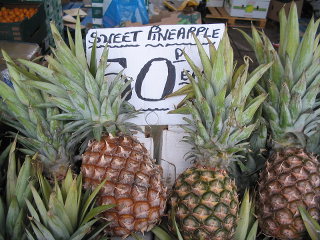Enzyme Diet
An enzyme diet is a type of raw food (or partly raw) diet. In it, you consume foods that have a high content of natural enzymes.
These foods could be:
- Raw plant foods
- Raw animal foods
- Raw cultured / fermented foods
You include high-enzyme foods and you avoid enzyme inhibitors. (Enzyme inhibitors are substances, such as drugs, preservatives, and even some naturally-occurring substances, that prevent enzymes from working.)
Cooking and many kinds of food processing destroy enzymes.
Edward Howell, the enzyme researcher, medical doctor, and author of Enzyme Nutrition, described an enzyme diet as "a regimen in which food is taken uncooked in the raw, unprocessed form, in possession of its full quota of enzymes."
High-Enzyme Foods

A food may be raw but still not contain many useful enzymes. Howell commented that lettuce will not digest your steak!
Some foods, however, have huge amounts of enzymes. To eat an enzyme diet, you have to include some of these foods.
Enzymes in Food
Here's a list of more than fifty high-enzyme foods plus more information. Read more.
All About Enzymes
Enzymes are special proteins that are responsible for all the life processes of living creatures. Enzymes carry out all the metabolic activities of the body. Our body manufactures these proteins; half of the protein that we eat is used for the creation of enzymes.
We digest our food thanks to enzymes made by the pancreas and elsewhere in the digestive system.
And, enzymes in food and supplements help us digest food and fight free radicals.
What are enzymes and what do they do?
Enzymes build new cells and tissues as well as break down food and metabolic waste. They are also used in medicine and found in raw foods and supplements. Read more
What are digestive enzymes?
Your body produces digestive enzymes to digest your food and to help your body extract nutrients and eliminate the rest. How enzymes work on the food as it moves through the digestive tract; how supplements and high-enzyme foods can help. Read more
Types of enzymes
Digestive and immune-supporting enzymes and antioxidant enzymes are available in supplements and food. Read more
Best digestive enzymes
Several high-quality brands provide supplemental enzymes for multiple purposes. Read more
Why An Enzyme Diet?
Raw and cultured high-enzyme foods have been vital to all healthy traditional human diets. World traditions include high-enzyme fruits, raw honey, raw fish, raw sauerkraut, raw milk, fermented raw milk, and many other special raw and cultured foods.
Observations made by Weston Price and others showed that people in traditional societies who ate these foods were far healthier than we are today.
Today these diets are used as prevention and treatment of modern diseases.
What's The Healthiest Raw Diet?
Successful raw food diets—that are successful for good health--are high-enzyme diets.
After all, not all raw foods are high-enzyme foods. Some raw foods have few enzymes and some raw foods contain enzyme inhibitors. If you don't consider enzyme content, you may neglect enzymes or even inhibit enzymes and defeat the purpose of a raw diet.
Popular raw food proponents include Gabriel Cousens and Ann Wigmore. Often, these well-known raw diets are vegetarian (allowing no animal flesh) or vegan (allowing no animal products).
But, an enzyme diet doesn't have to be vegan or vegetarian. Some raw foods are animal products, including milk and honey; but many raw fish and meat dishes are known world-wide. Some recipes can be found in Nourishing Traditions.
There is one use for cooking in this diet (unlike strict raw food diets): In some techniques, cooked foods (such as cooked grains or beans) are cultured to attain a high level of enzymes.
It's enlightening to consider the enzyme content of foods. You can go beyond following a diet and instead find the healthiest foods and superfoods.
Superfoods
Books About Enzymes
The Complete Book of Enzyme Therapy
An indispensable consumer-friendly guide to using enzyme supplements. Read more
Enzyme Nutrition
An overview of enzymes, how digestion requires enzymes, and how and why to get more enzymes in food. Read more
Enzymes: The Fountain of Life
Describes how enzymes treat medical conditions in therapies used by medical doctors in Europe and Japan. Read more
